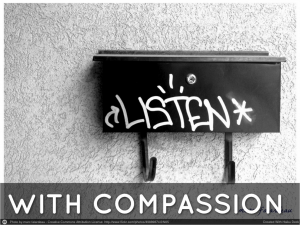Make Marketing Suck Less
How to Stop Office Gossip Once And For All
By Michelle Mazur > February 6, 2013
Filed Under Communication
Psst!
Did you hear about the office that has a problem with gossip? You know THAT office where the employees all complain and moan about their manager, the workload, and how they are treated. They just NEED to quit their complaining and do their work, right?
Wrong so very wrong!
I've often been asked: “How can I stop my employees from gossiping?”
The answer to this question lies in the answer to another question: “How happy are your employees?”
An uncomfortable silence follows where shoulders sag and eyes drop downward as the boss sheepishly admits, “We are working on the morale problem.”
Why is poor morale a breeding ground for gossip? Gossip actual builds bonds and lends support to employees who are stuck in less than ideal work situations.
Table of Contents
Work sucks but we've got each other
Happy employees rarely feel the need to gossip. They might need to vent on occasion when a project is stressing them out, but gossip about the boss or the company? Not really. For the most part, they are happy, treated well, and empowered. Why gossip about a problem when you can fix it?
Unhappy employees are prone to gossip. Why? They feel powerless to change their situation. Perhaps their boss is not open to constructive criticism. Or if employees speak up, their ideas are disregarded or legitimate complaints are treated like treason against the company.
Gossip is a sign of powerlessness. If you are serious about ending gossip for good, then EMPOWER your employees.
Rebuild trust
Unhappy employees don't trust the management. Empowering employees requires a complete overhaul of the company culture or at the very least management style. This starts by rebuilding trust. If employees were shut down in the past when they tried to make positive change, they are not going to believe your 360º turnaround.
Take an honest interest in your employees. Have a real conversation with them about things other than work. Ask how they are and be interested in the answer. Find out what their everyday life is like at work. They will be hesitant at first, but if you are sincere in wanting better for them and your organization they will come around.
Listen with a compassionate ear
Once you begin building trust – it's time to start listening with a compassionate ear. You are NOT going to like what you are going to hear. You must not take what they tell you personally. Focus on solutions to the problems that you are hearing over and over again.
Don't play favorites
Let's face it managers sometimes have to enforce crappy policies that come from upper management. You might not agree with your company's “butts in the seat 8-hours a day” policy, but it must be applied to all employees. If one employee continually slips out early and the boss know about it and does nothing – that person becomes a target of gossip and so does the boss.
You know what kills morale – bosses who play favorites. Apply policies (even awful ones) equally.
Take action
You know what you can do and what you can't do to improve morale. You've slowly rebuilt trust. You've listened to honest conversations now it is time to take action. Do something to improve morale. Something needs to come of those conversations that your employees have entrusted you with.
Follow-up on those conversations – even if upper management shuts you down and says no – you can tell your employees that you stepped up and tried to make a difference. It shows that you are on their side and not their adversary and target of gossip.
Gossip is a problem in the office, but its roots are in lousy morale and employees who do not feel listened to or empowered. As a manager, what can you do to improve morale and prevent gossip?
Create Your One-of-a-Kind Message
Your 3 Word Rebellion is the Key to Growing Your Business & Impact








